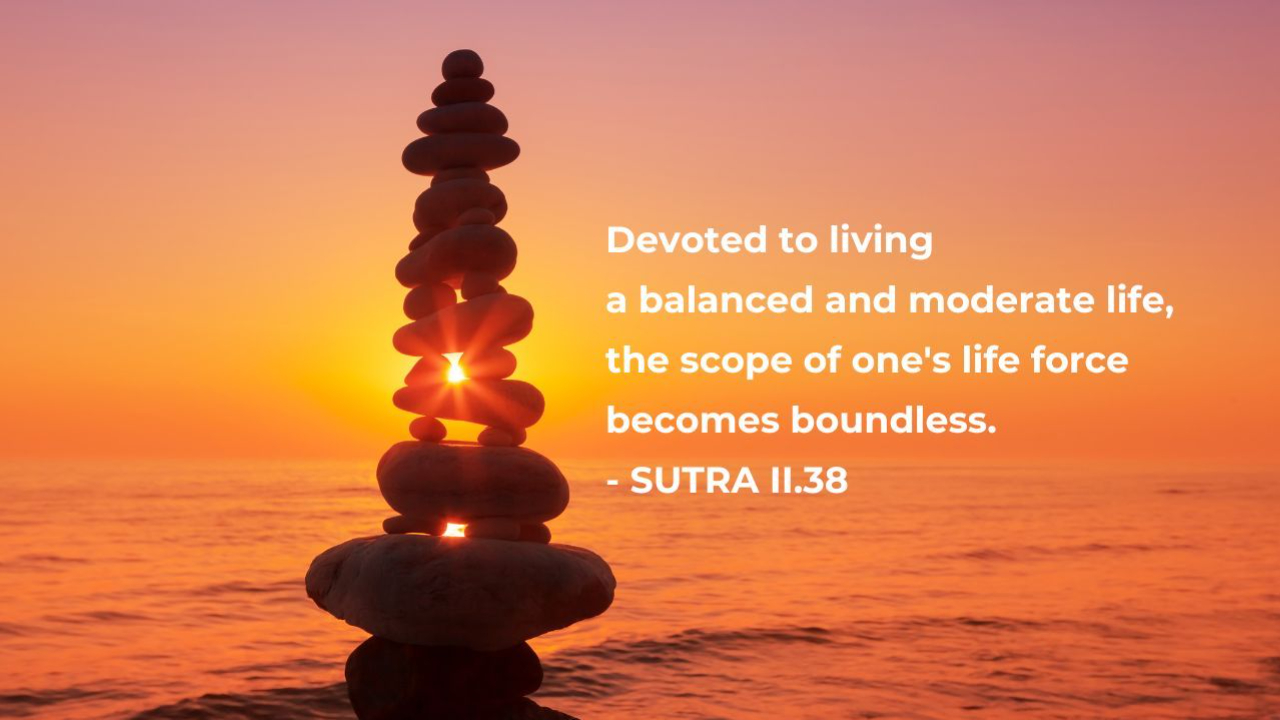Living in Moderation Brings Boundless Rewards

The Eight Limbs of Yoga: An 16 part mini-course
PART FOUR: BRAHMACHARYA
Our journey through the Yamas is teaching us to blend our human nature with our Divine nature by reflecting loving kindness and compassion for all (Ahimsa), living in truth (Satya), and reflecting generosity and honesty (Asteya). We are now introduced to the concept of living a life in moderation and balance.
The fourth Yama, Brahmacharya literally translates as walking in the way of God. Brahma meaning Unity Consciousness and Acharya is defined as pathway, teacher or scholar. It means aligning with the creative energy of the cosmos.
It was traditionally applied to an educational period of 14–20 years of age and refers to celibacy as a means to stay focused on ones studies. Among the Hindu monastic, Brahmacharya is the term used for the practice of self-imposed celibacy that is generally considered an essential prerequisite for spiritual practice. These characteristics correspond to Western notions of the religious life as practiced in monastic settings.
Deepak Chopra states that “in Hindu society, people traditionally chose one of two paths to enlightenment – the path of the householder and the path of the renunciate. For those choosing the path of a monk or a nun, the path to unity consciousness naturally includes forsaking sexual activity. For the vast majority of people choosing the householder path, brahmacharya means rejoicing in the healthy expression of sexual energy.”
In the west, Brahmacharya has been loosely interpreted as Moderation, referring to responsible behavior by preventing the dissipation of one’s energy through the misuse of the senses. You could call it a personal energy-conservation program—by not allowing the senses to rule your behavior, you are not urge driven.
Anything that causes turbulence in the mind and emotions might be seen as a violation of brahmacharya: over stimulating foods, loud music, violent movies, and yes, inappropriate sexual behavior. Whatever disturbs the mind and body disturbs the spiritual life; it is all one energy. Brahmacharya asks you to consider how you spend your energy.
“Each and every act and thought is an outflow of energy,” says Reverend Jaganath of the Yoga Life Society. “Some thoughts and actions offer beneficial dividends, while others simply drain our resources. In the name of continence, we are asked to be wise investors.” It’s best not to spend all of your energy right away so that you have nothing left. Become a good energy conservationist.
Are there places in your life where you could be more moderate? It could be food, work, exercise, computer, and so on. Choose one and begin to moderate its use. For example, cell phones. If you are attached to always having your phone in your hand, much like a security blanket, leave it at home or in your car for a few hours a day. Imagine what could happen in the small, uncluttered moments of your day.
During my time in California I found it disturbing that everyone was so plugged into their phones. It left no room for connection. Plus, unfortunately, there's a herding instinct that occurs and even though I prefer to be open to people, I sometimes catch myself joining the crowd by checking into my own text messages.
Instead, why not eliminate the distraction and see what arises. You may just find yourself more present with the world around you, enjoying the symphonic sounds and shifting light of nature, open to a spontaneous conversation with the person standing in line with you at the coffee shop. Trust that in moderating time on the cell phone you may actually bring more balance into your life and find comfort in your own company.
When applied to your Asana practice, you need to learn to regulate your effort so that you’re not pushing and forcing, which drains your life force. Asana should be replenishing your energy, not draining it.
Experiment with this practice on your mat, than take it into the rest of your life. By not giving so much energy to self imposed stress—by not squandering your life force—you will be more at ease and happier in all moments.
Yoga is not for one who eats too much, or for one who fasts too much, nor sleeps too much or sleeps too little, but instead lives in a harmonious flow along the middle path.
-Bhagavad-Gita
What are your thoughts on brahmacharya?
What are some interpretations that I may have missed?
How are you applying yourself to a life of moderation and balance?

